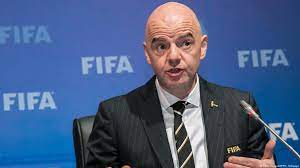By Andrew Abah, Abuja
Gianni Infantino, a contentious figure in the soccer world, secured a new term on Thursday as the president of FIFA, the sport’s global governing body, after an election in which he was the only candidate by acclamation.

Infantino, 52, was crowned for another four years by acclamation, with representatives from all but a small number of FIFA’s 211 national federations rising to applaud at FIFA’s annual meeting, held this year in Kigali, the Rwandan capital.
After rising from relative obscurity, Infantino became soccer’s top leader in 2016 after a huge corruption scandal that mared FIFA in probably the biggest crisis in its history.
FIFA rules drawn up by a group that included Mr. Infantino limit presidents to three terms of four years, but on the eve of last year’s World Cup final, he said that a review had “clarified” that his first three years in office did not count, allowing him potentially to run FIFA through 2031.
Infantino took office after his longtime predecessor Sepp Blatter was forced out after just one year of his latest four year term.
After confirmation of his re-election, Infantino appeared to recognise that he was not universally popular. “Those who love me, I know there are so many, and those who hate me, I know there are a few,” he said. “I love you all.”
While Infantino’s time in office has stabilised the governing body, his tenure has also been marked by curious public statements and bruising battles with some of soccer’s biggest stakeholders, including clubs, leagues and unions.
He has also been at the center of a power struggle with European soccer’s governing body, UEFA, where he had been the top administrator before his elevation to FIFA president.
FIFA has been in an almost constant conflict with UEFA since 2018, when Infantino tried to push through a $25 billion sale of new events, including an expanded World Cup for clubs that was considered a rival to UEFA’s hugely popular Champions League.
But this week, among the delegates at the FIFA gathering in Kigali, Infantino has appeared in his element. Many of the governing body’s member nations are relatively small or midsize countries that are heavily reliant on FIFA’s largess for much of their income.
Infantino also has a reputation for showcasing his relationships with politicians — including the likes of Donald J. Trump and Crown Prince Mohammed bin Salman of Saudi Arabia. In Kigali, he was joined at the congress by President Paul Kagame of Rwanda.
In his opening remarks on Thursday, Infantino recalled how he had traveled to Rwanda to lobby African officials during his first campaign to become FIFA president eight years ago. After being told that he could not count on their support, he said that he had been on the verge of pulling out.
But, he said, a visit to a memorial to the victims of the 1994 Rwandan genocide had “inspired” him to stay in the race.
Infantino courted controversy on the eve of the World Cup in Qatar last year with an extraordinary speech in which he lashed out at Western critics of the decision to stage the tournament in the Middle East for the first time. In Kigali, he found an ally in Kagame, who used his speech to back Infantino, making similar references to “constant hypocritical criticism.”
“Instead of asking why is it being held there, first ask, ‘Why not?’” Kagame said. “Unless we are talking about a kind of entitlement that only some of us from this bloc deserve to enjoy, it’s about keeping some people in their place, but that kind of attitude should have been left far behind in history by now.”
Critics of the Qatar World Cup had highlighted the deaths and mistreatment of workers hired for the grand construction projects that were built for the tournament, including several stadiums. Others drew attention to the country’s broader human rights record. Infantino was unmoved, describing the tournament as the “best ever.”
The FIFA conference in Kigali has offered a microcosm of Infantino’s presidency. He was feted by local politicians and national soccer executives, but drew criticism once more from farther afield.
An announcement this week that the 2026 World Cup in North America, the first 48-team tournament and the first expansion of the event since 1998, would be extended further by adding 24 games more than planned was met by fury from groups representing leagues around the world.
They offered what has become a familiar rebuke of Infantino’s FIFA: that the governing body announces major changes without consulting the groups involved.
Before delegates were asked to show their support for Infantino, the FIFA president made another speech outlining the organization’s achievements and the ways in which it had successfully staged the World Cup and planned for new ones.
He also reminded officials that FIFA had budgeted for record revenues of $11 billion over a four-year cycle to 2026, a figure that he said “will increase further by a few billion.”
At voting time, Infantino was backed by most of the room, including by delegates from his fiercest critics, such as the federations of the Netherlands and of England.


